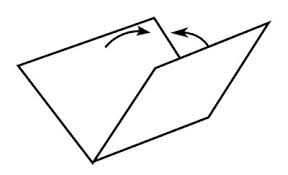中文词源
fold 折叠,羊栏
来自PIE*pel, 折叠,词源同triple, diplomat. 羊栏义词源不详。
英语词源
- fold
-
fold: [OE] The verb fold comes ultimately from the Indo-European base *pel-, which also produced Latin plicāre ‘fold’ (source of or related to English accomplice, complicated, explicit, perplex, plait, pleat, pliant, pliers, plight, ply, reply, and supple) and the final element -ple or -ble in such words as simple, double, or triple (which are hence related to the parallel Germanic formations twofold, threefold, etc).
Its Germanic descendant was *falthan, from which are descended German falten, Dutch vouwen, Danish folde, and English fold. The noun fold ‘enclosure for animals’ is of Germanic origin (Dutch has the related vaalt), but its distant antecedents are unknown.
=> accomplice, complicated, explicit, perplex, plait, pleat, pliers, plight, ply, reply, supple - fold (v.)
- Old English faldan (Mercian), fealdan (West Saxon), transitive, "to bend (cloth) back over itself, wrap up, furl," class VII strong verb (past tense feold, past participle fealden), from Proto-Germanic *falthan, *faldan (cognates: Middle Dutch vouden, Dutch vouwen, Old Norse falda, Middle Low German volden, Old High German faldan, German falten, Gothic falþan).
The Germanic words are from PIE *pel-to- (cognates: Sanskrit putah "fold, pocket," Albanian pale "fold," Middle Irish alt "a joint," Lithuanian pleta "I plait"), from root *pel- (3) "to fold" (also source of Greek ploos "fold," Latin -plus).
Of the arms, from late Old English. Intransitive sense "become doubled upon itself" is from c. 1300 (of the body); earlier "give way, fail" (mid-13c.). Sense of "to yield to pressure" is from late 14c. The weak conjugation developed from 15c. Related: Folded; folding. - fold (n.1)
- "pen or enclosure for sheep or other domestic animals," Old English falæd, falud "stall, stable, cattle-pen," a general Germanic word (cognates: East Frisian folt "enclosure, dunghill," Dutch vaalt "dunghill," Danish fold "pen for sheep"), of uncertain origin. Figurative use by mid-14c.
- fold (n.2)
- "a bend or ply in anything," mid-13c., from fold (v.). Compare similarly formed Middle Dutch voude, Dutch vouw, Old High German falt, German Falte, Old Norse faldr.
权威例句
- 1. But as other shops fold, the march of the superstores continues.
- 但在其他商店纷纷关门倒闭之时,大型超市的强劲扩张势头却依旧不减。
- 2. Fold the ironing board up so that it is flat.
- 把熨衣板折起放平。
- 3. The cost of a loaf of bread has increased five-fold.
- 一条面包的价钱增长了4倍。
- 4. The EU wanted to bring the US back into the fold.
- 欧盟想要让美国重新回到他们的阵营之中。
- 5. This nippy new car has fold down rear seats.
- 这辆速度很快的新车配有可以放倒的后座。

